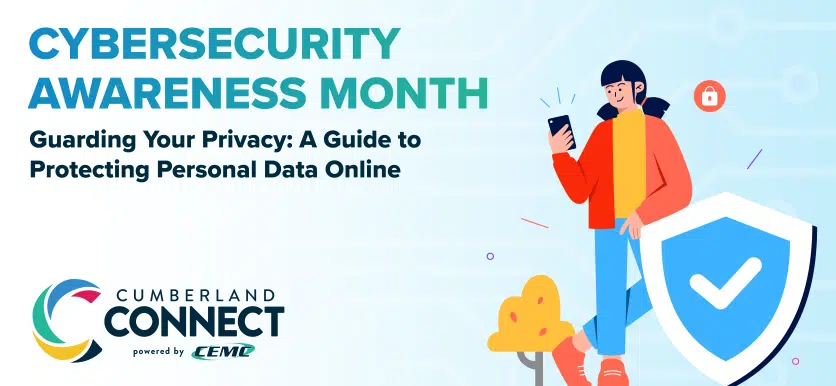Cybersecurity Awareness Month
Week 2 – Guarding Your Privacy: A Guide to Protecting Personal Data Online
In this week’s installment of our Cybersecurity Awareness Month series, we’ll cover a few simple strategies you can put in place to help avoid the dangers that cybercriminals create for Internet users. A strong cybersecurity strategy can help protect your privacy and shield you from online scams, data breaches, and even identity theft.
Online Privacy
Before you start scrolling through a website or social media platform, take some time to review your privacy settings. Websites, your browser/app, and even your device may have adjustable privacy settings to put you in control of what data is shared with the platform. Here are a few specific tips on preserving online privacy:
- Adjust privacy settings on social media platforms to control who can see your information.
- Use a Virtual Private Network (VPN) to encrypt your internet traffic and mask your IP address.
- Employ browser extensions like ad-blockers and script blockers to prevent tracking.
Data Breaches
You’ve probably heard of data breaches in the news – which is when user information gets leaked from a platform by a cybercriminal. While it can be scary to learn that your data may have been exposed, here are some tips to monitor your personal information and make sure your data remains secure:
- If you get notified that your data was leaked in a breach, change your passwords immediately – especially for the affected account.
- If a sensitive account with important information (i.e., bank information, home address) was affected, monitor your financial statements and credit reports closely for any suspicious activity.
- Enable two-factor authentication (2FA) on your accounts to add an extra layer of security. Do not ever share a 2FA code you receive to any third party.
Encryption Tools
Encryption is a powerful tool for securing your data, and is particularly useful for sensitive communications – such as an email that contains banking information:
- Use end-to-end encryption apps for messaging and file sharing if you need an extra layer of security.
- Encrypt sensitive files and folders on your devices.
- Consider using encrypted email services for added privacy, particularly for sensitive information.
Identity Theft Prevention
Identity theft is something that nobody wants to go through, but it is important to be aware and vigilant of this danger so you can protect yourself. Here are some tips to help prevent identity theft that go beyond the Internet:
- Shred physical documents containing sensitive information before disposing of them.
- Regularly check your credit reports for unauthorized accounts or activity.
- Be cautious when sharing personal information, even over the phone or in person.
- Be mindful of online scams or phishing emails
In an age where personal data is constantly at risk, taking proactive steps to protect your privacy is vital. By implementing these simple strategies, you can help minimize the chances of your sensitive information falling into the wrong hands. We’ll have more cybersecurity tips coming throughout the month of October. Stay safe!
